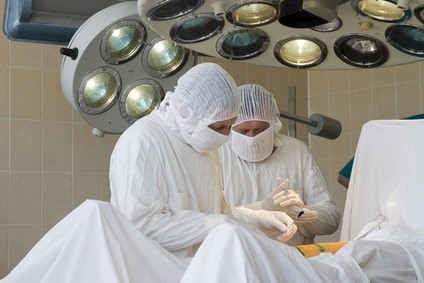Raw Food Diet and Surgery

You’ve been on the raw food diet for weeks, months, perhaps even years. Overall, your health’s better than ever. But now, you’re in line for surgery—a must-have, for whatever reason, in your situation. Needing surgery doesn’t always mean you’re sick. You might have suffered a sports injury, a fall at work or got in a car accident. Perhaps (as was the case with me and my congenital hip dysplasia) you have a structural problem that needs correcting.
I get many emails from people concerned about the interactions between raw foods and surgery—the surgery itself, preparation for surgery, and recovery. My first book, Your Right to Be Beautiful, describes my experience.
You are Different
Lets be clear…if you are successful on the raw food lifestyle, it means you will be super healthy, likely reach a level of health largely unknown to our modern medical establishment. In the result, your medical test parameters will be different from the population at large.
Your raw food diet will make you special. You will not be considered “normal” or 'average' in many aspects of life, the medical arena among these. The reason is simple. The “normal” ranges and standards are derived from surveys of cooked-food populations—people who are not internally very clean. Doctors and surgeons will expect your blood work and other tests to look like everyone else's.
Unexpected Test Results
Most doctors do not have much experience dealing with truly healthy people, and with raw foods aficionados in particular. Raw foodists seem to consistently show lowered levels of WBC and iron, sometimes of vitamin B12 or D. Even though you may be completely healthy, these values may send your doctor into panic mode. When you’re dealing with a surgery, this is the time to make things easier on yourself, not harder. This is not the time to get into a debate with medical professionals who might not agree with your dietary choices, nor the time to give your doctor apoplexy.
Your doctor will be highly concerned with your lab results and with everything being done according to protocol for a lots of reasons. Your doctor, remember, has not only your health as his primary concern, for he must also avoid liability issues. You want a stress-free, successful surgery and a healthy, speedy recovery. How can you balance these (sometimes competing) concerns? Here are some pointers I’ve picked up along the way. Some of these I’ve done myself, and others are solutions from readers sharing their experiences.
Add Some Cooked Food (What!?)
For the sake of your blood work and your doctor’s peace of mind—especially if you are still in the early stages of your raw food transition—it might serve you to add some cooked food into your diet before your surgery. Not only does this help prevent your body from being overly cleansed and sensitive, but it may make you a tad less conspicuous, medical test-wise, at a time when you don’t need the added burden of swimming upstream.
Here’s one reader's experience: I had my white blood cells tested about 3 weeks ago, and my result was 2.9. Normal range: 4.1 to 5.6. My doctor ordered a repeat test. Knowing my raw food diet was responsible for the test results, I ate some bread and cooked vegetables the afternoon before the test. Next morning my result was 4.2! I was happy I’ve proven to myself one more time how sensitive our bodies are to the quality of food we eat. Can you imagine my delight, when several days later in your book Quantum Eating I read that you experienced the same thing?
If you’re just transitioning to the raw food diet or are in the early months of eating that way, but still have some cooked foods now and then, it should be fairly easy for you to simply add in some cooked vegetables and perhaps some cooked salmon before your surgery. But if you’ve been committed a good long time to a 100% raw food diet, and cooked food in any form is simply not an option for you, then there are a few power-packed raw foods that are less well-known that may be helpful for you.
Here is my position: I believe everyone can be perfectly healthy on a 100% raw food diet, but the feedback I’ve received through the years has taught me that not everyone can succeed in staying 100% raw vegan in the long haul.
I feel obliged to say this, no matter how unpopular: I am sure that, while raw vegan works for some, it doesn't work for all. While this is not the platform for a vegan vs. non-vegan debate, I do want to point out that adding a few important non-vegan foods as temporary measures might be just the thing for some of you during the time of physical upheaval that surgery will undoubtedly cause.
Try Caviar and Eggs
Adding a spoonful of red or black caviar or a few raw eggs in the days before your surgery might help to boost nutrient levels, and will help bring some of your blood tests more within “normal” parameters. Raw eggs must be certified organic. Yes, I know about mercury in seafood, but a tiny amount of caviar will go a long way, and surgery is a time for compromise. In Russia, caviar is recommended for those who are weak or underweight. And surgeries are notorious for making you lose weight, sometimes much more than you want to.
Even an occasional raw egg or a spoon of caviar can help to satisfy B12 and D requirements for some who have digestive issues, since people with digestive issues often have a hard time absorbing nutrients. For some, I would consider it a temporary measure, a form of insurance, if you will, a slight detour for the sake of getting where you need to go. For others, it might even be a long term addition.If you do decide to add some raw egg to your diet, follow the some simple precautions outlined by Susan Schenck in her article Where Are the Raw Food Vegetarians? If you have my book Raw Food and Hot Yoga you can read the relevant excerpts from her article in the chapter: Is 100 Percent Raw Vegan Lifestyle for Everyone?
If you are strictly vegan and will not eat any animal products at all, even for purposes like this, then supplementation may be in order. Supplements, however, is not my area of expertise. I have no experience with supplements. This is a highly individual matter. I prefer to use food whenever possible. One of the websites that you can visit for more information about supplementation is Hallelujah Acres.
Juice!
After your surgery is finished, you won’t need to continue with these measures. Juicing is imperative during recovery after surgery. Juice three times a day whether in the hospital or not. Drink green smoothies for the added benefit of healing leafy green nutrition. If you can include wheatgrass juice, all the better. This is one of the most healing and cleansing green juices on the planet.
Plan ahead how you are going to get your juices and green smoothies. I know from experience that hospital staff will try to get you to eat their food. At this point in your journey, it is in your best interests not to succumb. Go back to your 100% raw diet, vegan or not, after your surgery, getting in plenty of green juices to help speed your recovery. As you get stronger, post-surgery, consider a weekly one-day juice fast to help speed removal of toxins and anesthesia from the surgery.
Sleep!
Get lots of sleep! This is non-optional, as our bodies do their best and most efficient healing work while we are sleeping. What’s more, you may well come out of hospital a bit sleep-deprived: Beds notwithstanding, hospitals are not the best places to get hours of uninterrupted sleep. When you have recovered sufficiently and have your doctor’s approval, get back to some gentle exercise as soon as you can.
I can only give you some insight and share experiences from myself and others as to what we have found to be helpful in dealing with blood tests, surgeries, and successful recoveries. In the end, it’s your experience and intuition that you’ll have to follow your intuition. That choice, that freedom, is part of what people love about the raw food diet anyway, isn't it? We become in tune with our bodies and the intelligence that is there to guide us.
As a raw foodist, you will be on one side of the pendulum, and you may find that your doctor will be on the other. You will likely hear conflicting recommendations. This is where you must take responsibility for your health and make informed decisions using all the information you can gather at your disposal.



